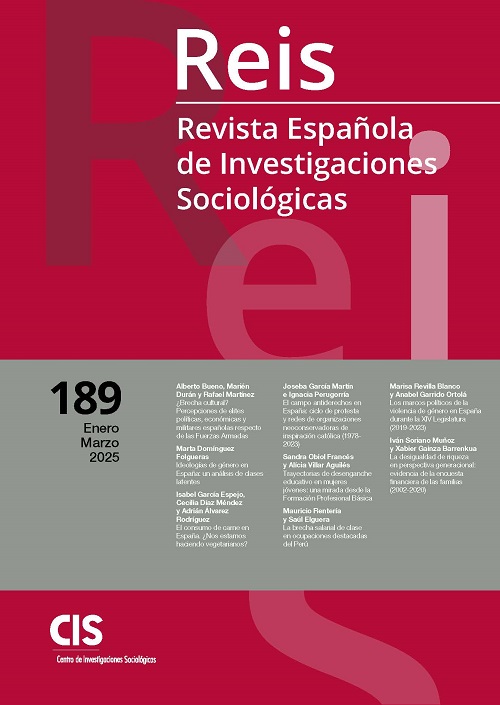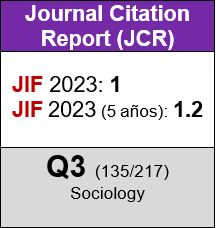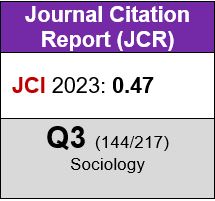La Desigualdad de Riqueza en Perspectiva Generacional
Evidencia de la Encuesta Financiera de las Familias (2002-2020)
DOI:
https://doi.org/10.5477/cis/reis.189.149-166Palabras clave:
Riqueza, Distribución, Desigualdad intergeneracional, Propiedad de vivienda, Hogares jóvenesResumen
A través de la Encuesta Financiera de las Familias elaborada por el Banco de España, y mediante índices de Gini y de Entropía Generalizada, el artículo analiza la evolución de la distribución de la riqueza neta entre grupos de edad durante el periodo 2002-2020. Los resultados muestran una creciente polarización y un deterioro en la posición relativa de los hogares jóvenes. La desigualdad se explica mayoritariamente por las dinámicas dentro de cada cohorte y los hogares jóvenes son hoy el grupo más heterogéneo, pero las diferencias entre grupos han aumentado notablemente. El análisis apunta a los cambios en la propiedad inmobiliaria como uno de los factores que explican la creciente desigualdad, ya que la vivienda es el principal activo de riqueza.
Descargas
Citas
Acemoglu, Daron; Naidu, Suresh; Restrepo, Pascual y Robinson, James A. (2013). «Democracy, Redistribution and Inequality». National Bureau of Economic Research, Inc. Disponible en: https://EconPapers.repec.org/RePEc:nbr:nberwo:19746 DOI: https://doi.org/10.3386/w19746
Anderssen, Erin (2015). «Growing generational divisions are a worrying millennial shift». The Globe and Mail, 23 de abril. Disponible en: https://www.theglobeandmail.com/life/parenting/growing-generational-divisions-are-a-worrying-millennial-shift/article24083323/
Appleyard, Lindsey y Rowlingson, Karen. (2010). «Home ownership and the distribution of personal wealth». Joseph Rowntree Foundation.
Arulampalam, Wiji; Booth, Alison L. y Bryan, Mark L. (2004). «Training in Europe». Journal of the European Economic Association, 2: 346-360. doi: 10.1162/154247604323068041 DOI: https://doi.org/10.1162/154247604323068041
Arundel, Rowan y Lennartz, Christian (2017). «Returning to the parental home: Boomerang moves of younger adults and the welfare regime context». Journal of European Social Policy, 27(3): 276-294. DOI: https://doi.org/10.1177/0958928716684315
Atkinson, Anthony B. (2015). Inequality; What Can Be Done? Harvard University Press. DOI: https://doi.org/10.4159/9780674287013
Ayala, Luis. (2016). La desigualdad en España: Fuentes, Tendencias y Comparaciones Internacionales. FEDEA.
Azpitarte, Francisco (2008). «The Household Wealth Distribution in Spain: The Role of Housing and Financial Wealth». Hacienda Publica Española, 194.
Barrett, Garry; Cigdem, Melek; Whelan, Stephen y Wood, Gavin. (2015). «The relationship between intergenerational transfers, housing and economic outcomes». AHURI Final Report, 2015(163): 1-64.
Bell, David NF. y Blanchflower, David G. (2015). «Youth unemployment in Greece: measuring the challenge». IZA Journal of European Labor Studies, 4. doi: 1. 10.1186/2193-9012-4-1 DOI: https://doi.org/10.1186/2193-9012-4-1
Bengtsson, Helena y Lyons, Kate (2015). «Revealed: The widening gulf between salaries and house prices». The Guardian, 2 de septiembre. Disponible en: https://www.theguardian.com/uk-news/2015/sep/02/housing-market-gulf-salaries-house-prices
Boertien, Diederik y López-Gay, Antonio (2023). «The Polarization of Real Estate Ownership and Increasing Wealth Inequality in Spain». European Sociological Review. 39(4): 615-629. doi: 10.31235/osf.io/b4k8t DOI: https://doi.org/10.1093/esr/jcac072
Bover, Olympia (2010). «Wealth Inequality and Household Structure: US vs. Spain». Review of Income and Wealth. 56: 259-290. doi: 10.1111/j.1475-4991.2010.00376.x DOI: https://doi.org/10.1111/j.1475-4991.2010.00376.x
Bover, Olympia (2011). «The Spanish Survey of Household Finances (EFF): Description and Methods of the 2008 Wave». SSRN. doi: 10.2139/ssrn.1888182 DOI: https://doi.org/10.2139/ssrn.1888182
Brandolini, Aandrea; Cannari, Luigi; D'Alessio, Giovanni y Faiella, Ivan (2006). «Household Wealth Distribution in Italy in the 1990s». Banca d'Italia: 225-275. doi: 10.4337/9781847203175.00015 DOI: https://doi.org/10.4337/9781847203175.00015
Buchmann, Marlis C. y Kriesi, Irene (2011). «Transition to Adulthood in Europe». Annual Review of Sociology, 37: 481-503. doi: 3710.1146/annurev-soc-081309-150212 DOI: https://doi.org/10.1146/annurev-soc-081309-150212
Case, Anne y Deaton, Angus (2020). Deaths of Despair and the Future of Capitalism. Princeton University Press. doi: 10.2307/j.ctvpr7rb2 DOI: https://doi.org/10.1515/9780691199955
Case, Karl E.; Quigley, John M. y Shiller, Robert J. (2005). «Comparing wealth effects: the stock market versus the housing market». Topics in Macroeconomics, 5(1): 20121001. DOI: https://doi.org/10.2202/1534-6013.1235
Chauvel, Louis (2010). «Comparing Welfare Regime Changes: Living Standards and the Unequal Life Chances of Different Birth Cohorts». En: J. Tremmel, (eds). A Young Generation Under Pressure?: 23-36. Berlin: Springer. doi: 10.1007/978-3-642-03483-1_2 DOI: https://doi.org/10.1007/978-3-642-03483-1_2
Christophers, Brett (2018). «Intergenerational inequality? Labour, capital, and housing through the ages». Antipode, 50(1): 101-121. DOI: https://doi.org/10.1111/anti.12339
Conde Ruiz, Juan I. y Conde Gasca, Carlota (2023). La juventud atracada: Cómo el electorado envejecido cercena el futuro de los jóvenes. Madrid: Ediciones Peninsula.
De Stefano, Valerio (2014). «A tale of oversimplification and deregulation: the mainstream approach to labour market segmentation and recent responses to the crisis in European countries». Industrial Law Journal, 43(3): 253-285. DOI: https://doi.org/10.1093/indlaw/dwu014
Deaton, Angus (2013). The great escape: health, wealth, and the origins of inequality. Princeton: Princeton University Press. DOI: https://doi.org/10.1515/9780691259253
Erola, Jani y Kilpi-Jakonen, Elina (2017). Social inequality across the generations: the role of compensation and multiplication in resource accumulation. United Kingdom: Edward Elgar Publishing. DOI: https://doi.org/10.4337/9781786432568
Fernández Kranz, Daniel (2017). «Los salarios en la recuperación española». Cuadernos de Información económica, 260: 1-11.
Fessler, Pirmin y Schürz, Martin (2018). «Private Wealth Across European Countries: The Role of Income, Inheritance and the Welfare State». Journal of Human Development and Capabilities, 19: 1-29. doi: 10.1080/19452829.2018.1507422 DOI: https://doi.org/10.1080/19452829.2018.1507422
Freedman, Michael (2023). «Earnings, Cohort Effects, and Inter-Generational Inequality: Evidence From the Luxembourg Income Study». Review of Income and Wealth, 70(2): 278-290. doi: 10.1111/roiw.12641 DOI: https://doi.org/10.1111/roiw.12641
Fuster, Nayla; Palomares-Linares, Isabel y Susino, Joaquín (2023). «Changes in young people's discourses about leaving home in Spain after the economic crisis». Advances in Life Course Research: 55. DOI: https://doi.org/10.1016/j.alcr.2023.100526
Gale, William. G. y Scholz, John K. (1994). «Intergenerational transfers and the accumulation of wealth». Journal of Economic Perspectives, 8(4): 145-160. DOI: https://doi.org/10.1257/jep.8.4.145
Gentile, Alessandro (2014). «La emancipación juvenil en tiempos de crisis: un diagnóstico para impulsar la inserción laboral y la transición residencial». Revista Metamorfosis: Revista Del Centro Reina Sofía Sobre Adolescencia Y Juventud, 0: 119-124.
Güell, Maia y Petrongolo, Barbara (2003). «How Binding Are Legal Limits? Transitions from Temporary to Permanent Work in Spain». Labour Economics, 14: 153-183. doi: 10.1016/j.labeco.2005.09.001 DOI: https://doi.org/10.1016/j.labeco.2005.09.001
Inman, Phillip (2014). «Baby boomer generation sees a new twist in an old argument». The Guardian, 9 de marzo. Disponible en: https://www.theguardian.com/uk-news/2014/mar/09/baby-boomers-survey-affluence-inequality
Jackson, Aandrew (2015). «Inequality and Inter Generational unfairness». Institut Broadbent, 16 de mayo. Disponible en: http://www.broadbentinstitute.ca/9344/inequality_and_inter_generational_unfairness
Kaas, Leo; Kocharkov, Georgi y Preugschat, Edgar (2019). «Wealth Inequality and Homeownership in Europe». Annals of Economics and Statistics, 136: 27-54. doi: 10.15609/annaeconstat2009.136.0027 DOI: https://doi.org/10.15609/annaeconstat2009.136.0027
Kotlikoff, Laurence J. y Summers, Lawrence H. (1981). «The role of intergenerational transfers in aggregate capital accumulation». Journal of Political Economy, 89(4): 706-732. DOI: https://doi.org/10.1086/260999
Lennartz, Chistian; Arundel, Rowan y Ronald, Richard (2015). «Younger Adults and Homeownership in Europe Through the Global Financial Crisis». Population, Space and Place, 22(8): 823-835. DOI: https://doi.org/10.1002/psp.1961
Ley 32/1984, de 2 de agosto, sobre modificación de determinados artículos de la Ley 8/1980, de 10 de marzo, Estatuto de los Trabajadores (1984). BOE. 4 de agosto de 1984, n.º 186. Disponible en: https://www.boe.es/eli/es/l/1984/08/02/32
Lindner, Peter (2015). «Factor decomposition of the wealth distribution in the euro area». Empirica, 42(2): 291-322. doi: 10.1007/s10663-015-9290-6 DOI: https://doi.org/10.1007/s10663-015-9290-6
Lux, Martin y Sunega, Petr (2023). «Housing wealth inequality, intergenerational transfers and young households in the super-homeownership system». International Journal of Housing Policy: 1-23. DOI: https://doi.org/10.1080/19491247.2023.2269618
Ma, Kang-Rae y Kang, Eun-Taek (2015). «Intergenerational effects of parental wealth on children's housing wealth». Environment and Planning A: Economy and Space, 47(8): 1756-1775. DOI: https://doi.org/10.1177/0308518X15597128
Martín, Natalia S. y García-Pérez, Carmelo (2023). «The Intergenerational Mobility of Income: A Study Applied to the Spanish Case (2005-2011)». Journal of Family and Economic Issues, 44(1): 65-83. doi: 10.1007/s10834-021-09809-w DOI: https://doi.org/10.1007/s10834-021-09809-w
Mathä, Thomas Y.; Porpiglia, Alessandro y Ziegelmeyer, Michael (2017). «Household wealth in the euro area: The importance of intergenerational transfers, homeownership and house price dynamics». Journal of Housing Economics, 35: 1-12. doi: 10.1016/j.jhe.2016.12.001 DOI: https://doi.org/10.1016/j.jhe.2016.12.001
Modigliani, Franco y Blumberg, Richard (1954). «Utility Analysis and the Comsuption Function: An Interpretation of Cross-Section Data». Post-Keynesian Economics, 1: 338-436.
Montgomerie, Johnna (2013). «America's debt safety‐net». Public Administration», 91(4): 871-888. DOI: https://doi.org/10.1111/j.1467-9299.2012.02094.x
Moreno Mínguez, Almudena (2018). «The youth emancipation in Spain: a socio-demographic analysis». International Journal of Adolescence and Youth, 23(4): 496-510. doi: 10.1080/02673843.2018.1438299 DOI: https://doi.org/10.1080/02673843.2018.1438299
Morissette, Rene; Zhang, Xuelin y Drolet, Marie (2002). «The Evolution of Wealth Inequality in Canada». SSRN Electronic Journal, 1984-1999. doi: 10.2139/ssrn.302880 DOI: https://doi.org/10.2139/ssrn.302880
Ong ViforJ, Rachel y Phelps, Chistopher (2023). «The Growing Intergenerational Housing Wealth Divide: Drivers And Interactions In Australia». Housing, Theory and Society, 40(2): 238-257. doi: 10.1080/14036096.2022.2161622 DOI: https://doi.org/10.1080/14036096.2022.2161622
Palencia-Esteban, Amaia y Salas-Rojo, Pedro (2023). «Intergenerational Mobility and Life Satisfaction in Spain». Mobility and Inequality Trends: 109-137. doi: 10.1108/S1049-258520230000030004 DOI: https://doi.org/10.1108/S1049-258520230000030004
Palomino, Juan C.; Marrero, Gustavo A. y Rodríguez, Juan G. (2019). «Channels of Inequality of Opportunity; The Role of Education and Occupation in Europe». Social Indicators Research, 143(3): 1045-1074. DOI: https://doi.org/10.1007/s11205-018-2008-y
Pfeffer, Fabian T. y Waitkus, Nora (2021). «The Wealth Inequality of Nations». American Sociological Review, 86(4): 567-602. doi: 10.1177/00031224211027800 DOI: https://doi.org/10.1177/00031224211027800
Piketty, Thomas (2015). El capital en el siglo XXI. Madrid: Fondo de Cultura Económica de España. doi: https://doi.org/10.17533/udea.le.n83a10 DOI: https://doi.org/10.17533/udea.le.n83a10
Piketty, Thomas (2020). Capital and ideology. Cambridge: Harvard University Press.
Rodríguez, Juan G. (2008). «Partial equality-of-opportunity orderings». Social Choice and Welfare, 31(3): 435-456. DOI: https://doi.org/10.1007/s00355-007-0290-8
Rodriguez-Modroño, Paula (2019). «Youth unemployment, NEETs and structural inequality in Spain». International Journal of Manpower, 40(3): 433-448. doi: 10.1108/IJM-03-2018-0098 DOI: https://doi.org/10.1108/IJM-03-2018-0098
Ruiz, Antonio; Gómez, Maria y Narváez, Mario (2004). «Efectos de la temporalidad sobre la formación recibida durante el empleo». Cuadernos De Economía: Spanish Journal of Economics and Finance, 27(74): 51-73.
Salas-Rojo, Pedro y Rodriguez, Juan G. (2022). «Inheritances and wealth inequality: a machine learning approach». Journal of Economic Inequality, 20(1): 27-51. doi: 10.1007/s10888-022-09528-8 DOI: https://doi.org/10.1007/s10888-022-09528-8
Sanderson, Paul (2017). The impacts of family support on access to homeownership for young people in the UK. Social Mobility Comission.
Stiglitz, Joseph (2013). The Price of Inequality. New York: W. W. Norton & Company. DOI: https://doi.org/10.1111/npqu.11358
Valenzuela-Garcia, Hugo (2021). «Teletrabajo y amplificación de la desigualdad en la sociedad post-pandemia española: teleworking and the amplification of inequality in spain's post-pandemic society». Revista Andaluza De Antropología, 1(19): 14-36. doi: 10.12795/RAA.2021.19.02 DOI: https://doi.org/10.12795/RAA.2021.19.02
Wind, Barend y Dewilde, Caroline (2019). «In which European countries is homeownership more financially advantageous? Explaining the size of the tenure wealth gap in 10 countries with different housing and welfare regimes». International Journal of Housing Policy, 19(4): 536-565. doi: 10.1080/19491247.2019.1608113 DOI: https://doi.org/10.1080/19491247.2019.1608113
Descargas
Publicado
Cómo citar
Número
Sección
Licencia
Derechos de autor 2024 Revista Española de Investigaciones Sociológicas

Esta obra está bajo una licencia internacional Creative Commons Atribución-CompartirIgual 4.0.
Permite Compartir — copiar y redistribuir el material en cualquier medio o formato, Adaptar — remezclar, transformar y construir a partir del material para cualquier propósito, incluso comercialmente.








